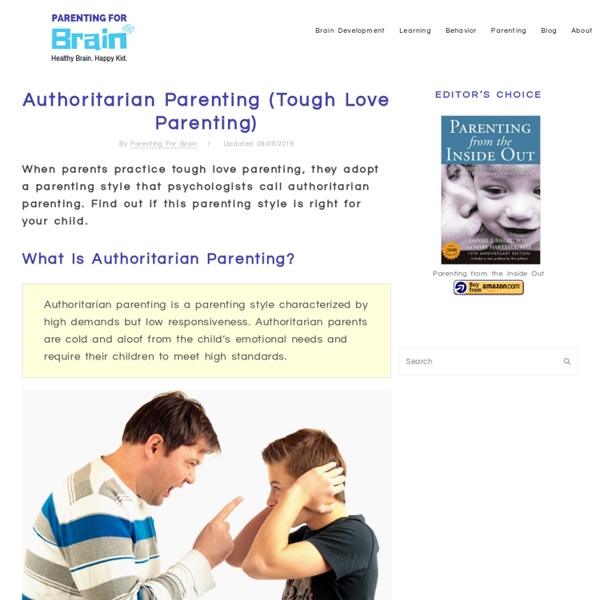



https://www.parentingforbrain.com/authoritarian-parenting-tough-love/
Related: Parenting Styles • The Four Parenting StylesThe Definition of Authoritarian Parenting Authoritarian parenting is a parenting style characterized by high demands and low responsiveness. Parents with an authoritarian style have very high expectations of their children, yet provide very little in the way of feedback and nurturance. Mistakes tend to be punished harshly. When feedback does occur, it is often negative. What Is Permissive Parenting? - Experts Explain Permissive Parenting While permissive parents are often very responsive and loving, this parenting style is defined by having no rules.The term was developed by psychologist Diana Baumrind, who studied preschoolers and found their parents mostly fit into three main parenting styles: authoritative parenting, authoritarian parenting, and permissive parenting. (A fourth parenting style, neglectful parenting, was added later to address extremely uninvolved and emotionally distant parents.) Studies show children of permissive parents are more likely to show signs of anxiety and depression, aggression, have bad social skills, and do poorly in school.
Authoritarian Parenting Style And Its Effects By Stephen Walton © 2012 What's It All About?... and What Are It's Effects The "Authoritarian Parenting Style" is an extremely strict form of parenting that expects a child to adhere to rules and regulations set out by the parents with little or no input or communication from the child. Developmental psychologist Diana Baumrind in her studies based on the dimensions of "Parental Responsiveness" and "Parental Demandingness" conclude that: The Definition of Authoritarian Parenting Authoritarian parenting is a parenting style characterized by high demands and low responsiveness. Parents with an authoritarian style have very high expectations of their children, yet provide very little in the way of feedback and nurturing. Mistakes tend to be punished harshly. When feedback does occur, it is often negative.
What Is Permissive Parenting? Permissive parenting is a type of parenting style characterized by low demands with high responsiveness. Permissive parents tend to be very loving, yet provide few guidelines and rules. These parents do not expect mature behavior from their children and often seem more like a friend than a parental figure.
Parenting Style Quiz What does it take to be a good parent? Literature on parenting identifies four main styles: Authoritative, Authoritarian, Permissive and Uninvolved. These are based on the extent to which parents are responsive (offer warmth and support) and demanding (level of behavioral control). Research has shown that a failure to balance these two key aspects of parenting can have very harmful effects on children and their future conduct.
What Is Authoritative Parenting? Authoritative parenting is characterized by reasonable demands and high responsiveness. While authoritative parents might have high expectations for their children, they also give their kids the resources and support they need to succeed. Parents who exhibit this style listen to their kids and provide love and warmth in addition to limits and fair discipline. This approach to parenting avoids punishment and threats and instead relies on strategies such as positive reinforcement. Brief History Characteristics and Effects of Uninvolved Parenting Uninvolved parenting, sometimes referred to as neglectful parenting, is a style characterized by a lack of responsiveness to a child's needs. Uninvolved parents make few to no demands of their children and they are often indifferent, dismissive, or even completely neglectful. The Major Parenting Styles During the 1960s, psychologist Diana Baumrind described three different parenting styles based on her research with preschool-age children: authoritarian, authoritative, and permissive parenting. In later years, researchers added a fourth style known as uninvolved parenting. So what does the uninvolved parenting style look like at a glance?
Smaller families in Singapore, leading to unhealthy parenting styles SINGAPORE: It really didn’t seem that long ago when the Stop at Two campaign was in full swing, warning parents in Singapore that “the more you have, the less they (each) get”. Yet, the challenge today isn’t to discourage families from having many children, but to coax or even cajole young Singaporeans to get married earlier and have them. Compared to a few decades before, family sizes are shrinking as new parents tend to have less children. Couples satisfy themselves with one or two kids being the norm, and three the exception. These days, the sex of the child is also of lesser importance. While Singaporeans traditionally prefer a boy to continue the family’s lineage, it seems more couples are waking up to the trend that daughters make more caring, homely and reliable caregivers in their old age.
Characteristics and Effects of Uninvolved Parenting Uninvolved parenting, sometimes referred to as neglectful parenting, is a style characterized by a lack of responsiveness to a child's needs. Uninvolved parents make few to no demands of their children and they are often indifferent, dismissive, or even completely neglectful. The Major Parenting Styles During the 1960s, psychologist Diana Baumrind described three different parenting styles based on her research with preschool-age children: authoritarian, authoritative, and permissive parenting. In later years, researchers added a fourth style known as uninvolved parenting. Uninvolved Parenting Style - Traits And Effects on Children Uninvolved or neglectful parenting is a considerably new parenting style that does away with hand-holding and guiding the children. It lets them learn by themselves. Parents could be uninvolved in varying degrees. While most parents look after the basic needs such as food and shelter for their kids, some others neglect their children completely.